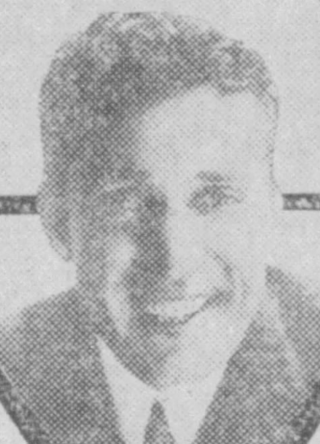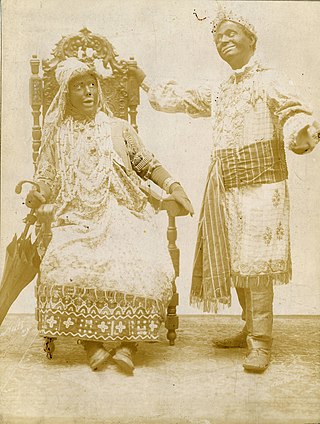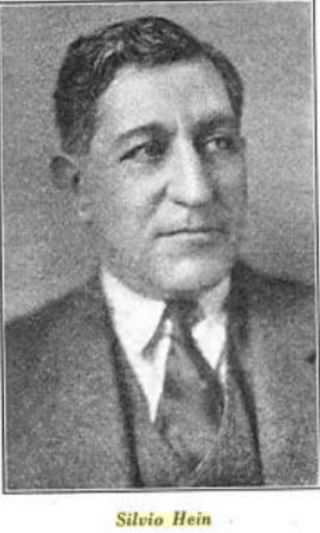Related Research Articles

Jean Schwartz was a Hungarian-born Jewish American composer and pianist. He is best known for his work writing the scores for more than 30 Broadway musicals, and for his creation of more than 1,000 popular songs with the lyricist William Jerome. Schwartz and Jerome also performed together on the vaudeville stage in the United States; sometimes in collaboration with Maude Nugent, Jerome's wife, and the Dolly Sisters. Schwartz was married to Jenny Dolly from 1913 to 1921.
The American Music Hall, also known as the American Theater until 1908, was one of the oldest Broadway venues. Located at 260 West 42nd Street, it was designed by the architect Charles C. Haight, with a capacity of 2,065. It opened on May 22, 1888.

The L-KO Kompany, or L-KO Komedies, was an American motion picture company founded by Henry Lehrman that produced silent one-, two- and very occasionally three-reel comedy shorts between 1914 and 1919. The initials L-KO stand for "Lehrman KnockOut".

William Hill, known professionally as Billie Ritchie, was a Scottish comedian who first gained transatlantic fame as a performer for British music hall producer Fred Karno — thus, a full decade before Stan Laurel and Charlie Chaplin took a similar career path. Ritchie is best recalled today for the silent comedy shorts he made between 1914 and 1920 for director/producer Henry Lehrman's L-KO Kompany and Fox Film Sunshine Comedy unit.

The Earl Carroll Vanities was a Broadway revue presented by Earl Carroll in the 1920s and early 1930s. Carroll and his show were sometimes controversial.
Ernest Albert, born Ernest Albert Brown, was an American painter, illustrator, muralist, and scenic designer. He was a prolific scenic designer, first in St. Louis and Chicago and then on Broadway. He is considered a major American landscape painter and was elected the first president of the Allied Artists of America in 1919.
The Billionaire is a musical in three acts with music by Gustave Kerker, and both book and lyrics by Harry B. Smith. The show was written with the backing of producers Klaw and Erlanger and was made specifically for the talents of Jerome Sykes who portrayed "The Billionaire", John Doe. The action of the musical begins in Nice, France during Carnival where the billionaire Sykes meets a young American girl, Pansy Good, studying to be an actress. Impressed with her talents, he buys her Doe's Theatre in New York City and establishes her as a star. Later, Doe attempts to ride a horse in a race at the Longchamp Racecourse in Paris, but is too fat to succeed. Pansy rides the horse instead and wins the race.
The Errand Boy is a musical in two acts with lyrics by Edward P. Moore and a book by George Totten Smith. Created as a starring vehicle for vaudeville star Billy B. Van, the composer of the music for this work was never credited. Set in the town of Georges Mills, New Hampshire, the plot centers around the local errand boy Patsy Bolivar who becomes involved with a troupe of traveling performers stranded in his town.
The Gingerbread Man is a musical in two acts with music by A. Baldwin Sloane and both book and lyrics by Frederic Ranken. Described by the creators as a "Fanciful Fairyesque", the work was essentially a Christmas musical with Santa Claus and Mrs. Claus serving as the heroes of the piece.
Coming Thro' The Rye is a "satiretta" or musical in two acts with both lyrics and book by George V. Hobart and music by A. Baldwin Sloane and J. Sebastian Hiller.
Gay New York is a musical in two acts with both book and lyrics by Maurice Hegeman and music by Harry Trappert. The musical was adapted from an unidentified German-language operetta.
Lee Orean Smith was an American composer, arranger, music editor, publisher, music teacher, multi-instrumentalist, and conductor. A diverse composer who began his career writing Tin Pan Alley songs and music for the theatre, he later had a prolific output of published band and orchestral works; both arrangements and original pieces. He published music not only under his own name, but also under numerous pseudonyms, including Calvin Grooms, Maurice Lee, Leon Obrero, José Santos, Leopold Lamont, and François Chevalier. Smith composed music for multiple works staged on Broadway, and was the longtime managing editor of the band and orchestra department in the music publishing firm of Leo Feist. At the time of his death he was an editor for Carl Fischer Music.
Benjamin Stannard Mears, also known as Ben Mears, Ben S. Mears, and Stannard Mears, was an American stage actor, vaudeville performer, and playwright. He is best known for the 1918 play Seventeen; an adaptation of Booth Tarkington's 1916 novel of the same name which he co-wrote with Hugh Stanislaus Stange.
Leona Stephens, also known as Leona Hollister, Leona Stephens Hollister, Leona Hollister West, and Leona Stephens Hollister West, was an American actress, vaudeville performer, playwright, and songwriter who had an active career on stage and radio during the first half of the 20th century.
The Floor Walkers was a road musical that was created as a starring vehicle for the comedy duo of Hap Ward and Harry Vokes to feature their signature roles of the tramps Lord Percy Harden and Lord Harold Poorly ; characters the duo had previously portrayed in the earlier musicals A Run On the Bank (1895) and The Governors (1898). The Floor Walkers had no attributed author for its book or lyrics, but the music for the production was created by composer Herbert Dillea who also served as the musical's music director. The most well known song from the show was "Absence Makes the Heart Grow Fonder"; which was the only song to have an attributed lyricist, Arthur Gillespie. This song was for a time a popular standard and was recorded multiple times by singer Harry Macdonough and cornetist Jules Levy for records made for the Victor Talking Machine Company and Columbia Records from 1902 through 1905, and later was recorded by Wayne King in 1947.

Charlotte Louise Johnson, known as Lottie Williams and Lottie Thompson, was an American actress, singer, and dancer. A pioneering performer in African-American musical theater, she is best remembered for starring in several stage works with her second husband, Bert Williams, both on Broadway and in vaudeville. These included several musicals created by composer Will Marion Cook, lyricist Paul Laurence Dunbar, and the playwright Jesse A. Shipp; including Sons of Ham (1900), In Dahomey (1903), and Abyssinia (1906) among other works. In these musicals she portrayed mainly supporting character roles and was usually a featured singer and/or dancer. However, she portrayed the title role and the main protagonist in the Cook, Dunbar, and Shipp musical My Tom-Boy Girl (1905).

The Ham Tree is a "musical vaudeville" in three acts with music by Jean Schwartz, lyrics by William Jerome, and a book by George V. Hobart. A popular success from its debut in 1905, the work toured for several years; including three separate runs on Broadway. The work was created as a starring vehicle for vaudeville and minstrel show stars James McIntyre and Thomas Heath who were known for their work as blackface performers. The work incorporated several of their prior popular routines and sketches from their work on the vaudeville stage in order to appeal to their fan base. The concept of a "ham tree", along with other humorous trees like an "egg tree", was a repeating gag in their works dating back to their performances in The Georgia Minstrels in the 1890s and early 1900s. Following its initial tour, the work was revived by McIntyre and Heath several times, and was later heavily revised and retitled Hello, Alexander for a Broadway staging in 1919.

Silvio Hein was an American composer, songwriter, conductor, and theatrical producer. He was a songwriter for Tin Pan Alley and composed the scores to fourteen Broadway musicals. His most successful stage work was the 1917 musical Flo-Flo which he created with the French librettist and playwright Fred de Gresac. His songs were also interpolated into musicals created by others, including The Little Duchess and Ziegfeld Follies. In addition to his work writing music, he also worked as both a conductor and producer on Broadway. In 1914 he was a founding member of the American Society of Composers, Authors and Publishers.

The King's Carnival is a musical burlesque in two acts with music by A. Baldwin Sloane and both book and lyrics by Sydney Rosenfeld. The musical also included one hit song by the songwriting team of Jean Schwartz and William Jerome, "When Mr. Shakespeare Comes to Town". The musical was a parody of several Broadway shows that dealt with royalty and courtly drama, including targeted spoofs of Paul Kester's When Knighthood Was in Flower, Clyde Fitch's The Climbers, Paul M. Potter's Under Two Flags, and Lorimer Stoddard's In the Palace of the King.